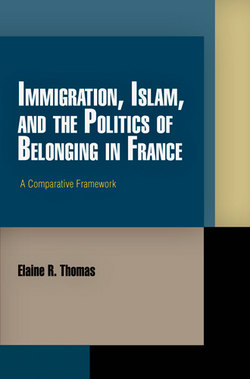Читать книгу Immigration, Islam, and the Politics of Belonging in France - Elaine R. Thomas - Страница 14
На сайте Литреса книга снята с продажи.
ОглавлениеChapter 4
Nationality Law Reform: Launching a New Debate
As the 1980s continued, France’s politics of belonging took a new twist as political struggles over changing French nationality law came to the fore. The issue of nationality law reform had previously been raised by immigrant advocates on the left, but was in the 1980s originally associated with the political right, with positions on the issue framed primarily in conventional left-right terms. Public education and its integrative role, later greatly emphasized, was not a major theme in the early, radical campaign for nationality law reform.
As late as 1986, a conceptual gulf separated influential nationality law reform advocates’ understandings of political membership from those of leading advocates of “new citizenship.” Demands for reform of French nationality law originally proved politically polarizing and led to a decidedly unproductive political impasse. In the end, however, the conflicts of the 1980s over nationality law reform had surprisingly enduring consequences.
These struggles, and the political stalemate to which they originally led, set the stage for the French government’s appointment of an influential expert commission on nationality law.
There is a natural but anachronistic tendency for analysts and observers to see only the obvious historical continuities between the Nationality Commission’s work and France’s long-term political and intellectual history. In reality, however, the apparently consensual and historically continuous “republican” parameters of France’s politics of belonging that crystallized around the work of the Nationality Commission were markedly different from the prevailing terms of French membership politics just a few years earlier, when nationality law reform first emerged as a major national issue.
The Nationality Commission’s widely publicized work played a key role in promoting the political rise of an influential neo-republican position bridging the former conceptual divide between the nationality law reformers’ understandings of political membership and those of their opponents. This work thus contributed significantly to toning down the crisis over nationality law change, and constructed an amalgamated theoretical basis for new patterns of more centrist political cooperation, albeit still fragile ones. At the same time, the decisive and consequential conceptual reorientation encouraged by the Nationality Commission also placed an increasingly heavy symbolic load on the integrative role of public schools, thus setting the stage for more recent, school-centered controversies.
The Retreat from Forced Return of Immigrants and Emergence of Demands for Restrictive Nationality Law Reform
As we have seen, the late 1970s and above all the 1980s were a time of growing realization that culturally diverse immigrants were in France to stay, and thus a moment of rising anxiety about cultural assimilation. Certainly, it would be an oversimplification to see all this anxiety as symptomatic of underlying racism. Not everyone anxious about how immigrants’ long-term settlement might change the face of France understood culture as directly linked to race. For some, including intellectual historian Raymond Polin, culture was instead regarded as the product either of education or of choice and loyalty (Polin 1987: 624–25, 636, 639).
The years 1978–1980, however, saw a surprising French governmental initiative from President Valéry Giscard d’Estaing and Lionel Stoléru, minister of manual workers and immigrants. Faced with stubbornly high unemployment and public anxiety, they sought a nationally and ethnically discriminatory approach to immigration: an attempt to force return of substantial numbers of unwanted foreigners who had been legally resident in France, above all Algerians, to their countries of origin. These efforts met with substantial legal, political, and administrative resistance and were therefore ultimately unsuccessful. The new immigration bill of 1984 marked a clear defeat of this nationally and ethnically discriminatory approach to immigration policy.
